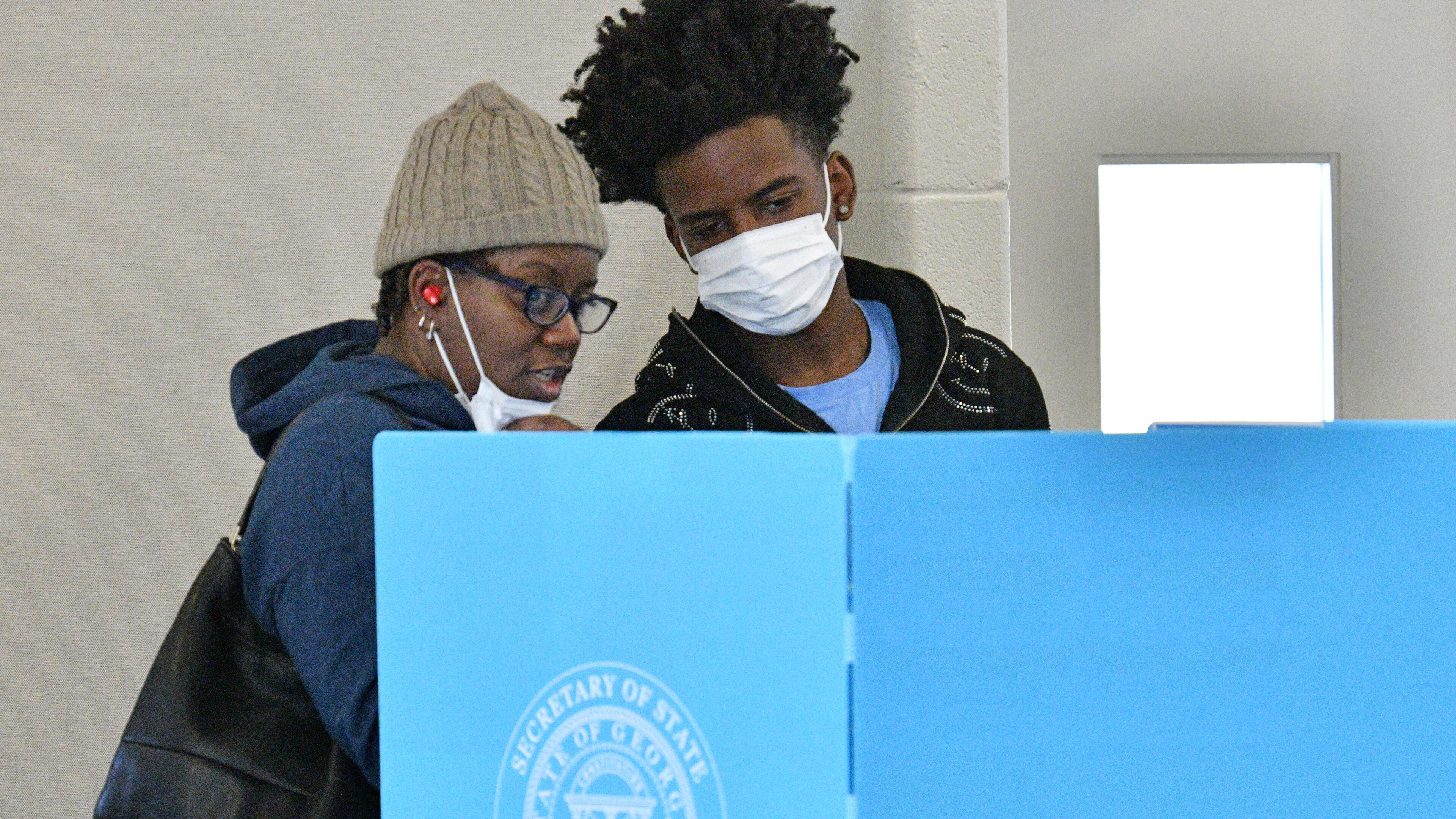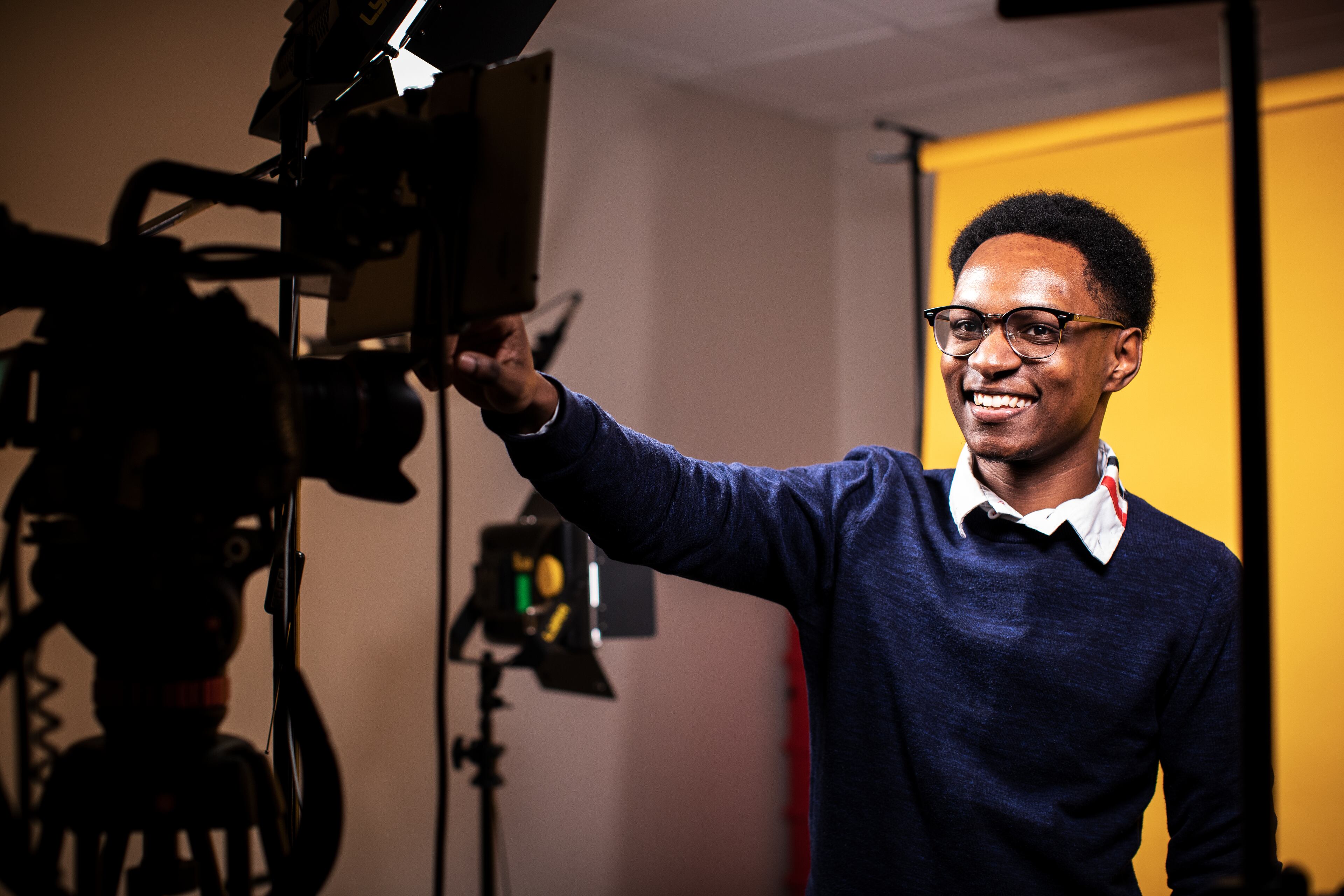Opinion: The ballot box is powerful; younger voters should use it

I am fully aware that telling someone plainly to “go vote!” can feel empty and trite. Especially if you are a younger person and the idea of homeownership and not being in student debt feel like relics of a bygone era that you’ve never even experienced.
For my generation that has lived through the first attack on U.S. soil since Pearl Harbor, several recessions, a 20-year war and the deadliest pandemic since 1918 -- all in our most formative years -- saying “go vote!” can feel like nailing a 2x4 over a hole in the Hoover Dam.
Activism and organizing are essential parts of our democratic process. And even though it might seem paradoxical to some, if you want any sort of real change then the only way to get those reforms is to vote.

And not just once every four years.
From an early age I came to appreciate the power of the ballot.
Growing up, politics were never a taboo topic. In fact, asking questions about how the world works was encouraged. Which probably explains my career choice.
I have very clear memories of my father teaching me how a bill becomes a law as we would play a round of chess. Incidentally, I still haven’t beaten him to this day. He’s sly with his rooks!
When dad would explain how something in government works, it felt like he was explaining a new set of rules. The stakes around politics and policy are obviously much higher than a game of chess, but you get the basic premise.
In both chess and in democracy, there are rules; there is an order – different pieces do different things, much like our separation of powers.
But, unlike the chess game, by voting, we can remove pieces, change what they do and even adjust the rules as we see fit. The system is then supposed to work for us and with us.
Not against us.
I realize now that this framing leads me not to focus on one political leader or party. But rather on a system of incentives and punishments. Sticks and carrots, if you will.
Voting is not only picking who represents you, but also picking the rules they have to play by. Whenever I think about real, systemic change in this country my mind immediately goes to the Voting Rights Act of 1965.
That’s because of how pivotal it was -- and how recently it happened.
The United States has always had a complicated relationship with democracy for all, to put it charitably. When the Voting Rights Act of 1965 was signed into law, we finally had a full-fledged, multicultural democracy.
That was only 57 years ago -- 57 years!
That’s in the lifetime of parents, grandparents, aunts and uncles. Someone reading this might even remember first getting the right to vote at that time.
When I walk into any voting booth, especially in the South, I feel an immense amount of pride. I’m overwhelmed with the knowledge of what it took to get here. All the debates over my rights and the courage it took for people of all backgrounds to stand up and push our country. To have it make good on the promise that was written so long ago.
The United States is capable of some truly profound changes, but they don’t come if people don’t vote.
They won’t come if you don’t choose representatives who will truly and earnestly vote on your behalf.
This is true at every level. From your local tax commissioner and other elected officials to the president of the United States, your vote matters. From school board referendums to choosing a U.S. Senator, your vote matters.
It matters so much that the fight to get the vote to everyone took 200 years. We are still at the very beginning of everyone having a voice in this nation.
Don’t silence yourself.
Vote.
Because your voice matters.
Joseph Ferguson is a social media producer for The Atlanta Journal-Constitution. He’s spending time on our Opinion team this fall.
THE YOUNG VOTE
Young voters are the future of our country, and they’re expected to turn out in record numbers in this year’s midterm elections.
In fact, a poll published last week found that 40 percent of respondents between the ages of 18 and 29 said that they will “definitely” vote in November’s midterm elections.
That turnout is expected to match – or perhaps even exceed – the record set among young voters in 2018, according to the Institute of Politics at Harvard Kennedy School, which conducted the poll.
Today, we’ll sharing insights from younger voters, some of whom will be casting ballots for the very first time.
They’ll remind you that their vote matters – and so does yours.
YOUNG VOTER VOICES
“It’s our part of making democracy work and making sure that your vote counts. It’s very important, especially in today’s climate. We have learned how important it is that people go to the polls and actually vote for who they want in office. When you do your own research and you see that when we all get together, and we vote for a specific candidate that reflects our views, then we elect a person to office and that person represents us.”
Hugo Donis
“I feel like it’s a way for me to voice my opinion because for 18 years I had to suppress it.”
Parker Parks
“Getting to the polls is a civic obligation. It’s our civic duty. It is the direct way to make our voice heard. That is why I’m getting to the polls so that we can work for underserved communities, hold our officials accountable and make sure that all of us are good at the end of the day.”
Ann Philip
“I say it’s a critical point in Georgia. I think it’s really important that everyone gets out their votes for their opinion to be heard.”
Sean Cunningham
“To be honest, I was just raised to believe that it’s a very important part of our democracy and that it’s something that we should all contribute to. While I don’t think that voting in individual politicians is going to create that (change) overnight, I think that by voting for the right people, we can kind of walk in the right direction … and take the right steps.”
Jack Dicarlo
Compiled by Toni Odejimi
VOTING IN GEORGIA
Where and when can I vote on Election Day?
Polls are open from 7 a.m. to 7 p.m. on Nov. 8. You can find your polling place on the Georgia secretary of state’s website: mvp.sos.ga.gov
Can I vote early?
Early voting is available in every county in Georgia through Friday, Nov. 4. Check the secretary of state’s website for locations.
Do I need ID?
Georgia law requires photo identification when voting, either in person or absentee. It’s the way your county ensures it’s you casting your ballot and not someone who isn’t eligible to vote.
Any valid state or federal government-issued photo ID, including a free ID card issued by your county registrar’s office or the Georgia Department of Driver Services.
- A Georgia driver’s license, even if expired
- Student ID from a Georgia public college or university
- Valid employee photo ID from any branch, department, agency, or entity of the U.S. government, Georgia or any county, municipality, board, authority or other entity of this state
- Valid U.S. passport ID
- Valid U.S. military photo ID containing a photograph of the voter
- Valid tribal photo ID containing a photograph of the voter
What if I don’t bring an ID to vote?
If you are unable to provide ID, you will be able to vote a provisional ballot. You will need to provide a copy of your ID within three days after the election to your county Board of Elections and Registration. As long as you do so, your provisional ballot will be counted, as long as you are otherwise eligible to vote.
How can I check the status of my ballot?
That information is on the Georgia secretary of state’s website.
Source: Georgia secretary of state
OUR VOTER GUIDE
The Atlanta Journal-Constitution and Atlanta Civic Circle teamed up to contact hundreds of candidates to provide voters with a side-by-side look at the candidates for office, their views on issues voters care about most, their party affiliation and their history in elective politics.
On ajc.com, our Georgia Decides voter guide includes basic information on candidates for statewide office, the legislature and candidates for local office throughout metro Atlanta. These include county officials such as county commissioners and school board members.
ABOUT THIS SERIES
This week, we’re dedicating this space to a collection of pieces that remind you that, yes, your vote does count, and, yes, our elections are secure.
That means the Atlanta Forward pages will look a little different.
You’ll notice that we are not publishing letters to the editor this week. We’re giving our national columnists, such as George Will and Leonard Pitts, a break. And Mike Luckovich and our From the Right cartoonists will return in a week.
Throughout the week, our hope is to engage in a civil and non-partisan discussion. We’ll experiment with different ways of presenting information. Along the way, you’ll hear a lot from your neighbors about the importance of voting.
To help you cast your ballot, you’ll also notice that we will be providing plenty of useful information, such as how to find your polling place and what you need to bring to the polls to do your part to uphold our Democracy.
More Stories
The Latest


